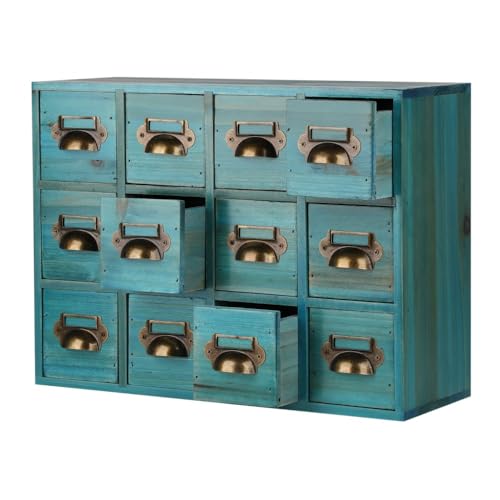Scratch USPS Express Original Design / Scratch Built
Scratch - USPS Express {Scratch}
Contributed by Hans "Chris" Michielssen
| Manufacturer: | Scratch |
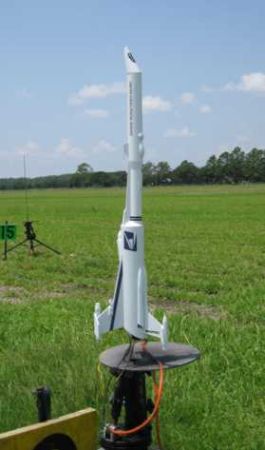
Brief:
This has been an interesting year for me. I call it "Rocketry On A Budget". A box of parts was donated by
Jonathan Stewart from Plano Texas. I thank him for his generosity. I received my box on March 4, 2009.
Construction:
An inventory of the parts:
- A) BT-5 12" long
- B) BT-5 size 3-½" long party horn tube
- C) BT-20 14-½" long
- D) BT-50 4" Clear Tube
- E) BT-50 12-½" long
- F) BT-55 14" long
- G) BT-56 11" long
- H) BT-55 12" long
- I) BT-60 3" long
- J) BT-60 10 ½" long
- K) BT-80 15 long
- L) 2 BT-5 "Pod" assemblies 5" long each (nose cones glued in each end)
- M) 4 BT-5 Nozzles assemblies, 2-1/4" long each
- N) 4 BT-3 Pod assemblies 2" long each
- O) 20/50 Balsa Transition adapter
- P) 55/60 Plastic Transition Adapter
- Q) Balsa Conical Nose Cone for BT-5
- R) Plastic Nose Cone for BT-55
- S) Balsa Nose Cone for BT-20
- T) 2 (Usable) BT-50 Balsa Blocks
- U) 4 Engine Hooks (different sizes)
- V) "Street Marker" Conical Cone, 2" at base
- W) 1 Clear Plastic "Half" Bubble 2-½" long
- X) 6 "Pre-cut balsa Fins
- Y) 5 Launch Lugs 1/8" X 1"
- Z) 1 Launch Lug 3/16" X 4"
- AA) 4 Cardstock Tubes, 3/16" X 5-½"
- BB) 5 Popsicle Sticks
- CC) 3 Golf Tees
- DD) 2 Screw eyes
- EE) 1 Bamboo Skewer 5-½" long
- FF) 4 Black Plastic "Landing Feet"
- GG) 1 Yellow Plastic Dome 3" diameter
- HH) Various Fiber Centering Rings
- II) 2 Black Plastic "Angle" Pieces
- JJ) 1 20 size Engine Block
- KK) 10 Various Plastic "Tips, ends and points"
- LL) Orange Plastic Streamer 54" X 2"
- MM) 3/8" wide Black Shock Cord--long!
- NN) 5 small plastic "Missiles"
- OO) 4 White plastic Star Wars guns
- PP) 8 small orange plastic "Tips"
- QQ) 1 Plastic Candy Container
- RR) 6 plastic "Plugs" Many holed
- SS) 24" Nylon Parachute
- TT) 36" Nylon Parachute
- UU) 1 sheet Basswood 1/8" X 4" X 24"
- VV) 1 sheet Basswood 1/8" X 4" X 16"
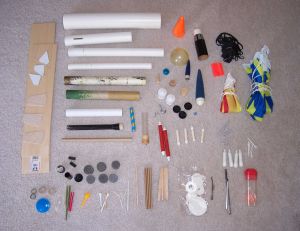
Some of the tubes have been pulled from older painted models. There is some epoxy glue residue and paint. I'll have to cut off some of the rough edges and fill some imperfections.
With so many small, decorative pieces sent, it made the best sense to build a sci-fi fantasy spaceship.
It seemed there is too many parts in the box! Rather than just gluing everything to the main tube, I'll try to combine as many (recognizable) parts into sub-assemblies and then attach them to the model.
Most all construction is documented on the PDF instructions and patterns. All parts listed above are referenced in the file by the same reference letter(s), too. This PDF is the Assembly View
I had opened the box when everything had first arrived. I was a little overwhelmed. I wanted to incorporate as many interesting parts as possible but to try and do it with some sort of consistent decorum. I also had the "Surprise Items" to consider. For instance, how do I add four popsicle sticks? They have to be recognizable but still stay with the flow of the design.
I visualized many of the body tubes and one adapter together on the floor. From the rear forward: The large diameter BT-80 "engine compartment" (K) will connect to the trimmed Yellow Plastic Dome (GG). Larger coolant "vanes" (UU) will be cut to fit the dome and tube transition. This would continue to the BT-55 (F). Next is the Plastic 55/60 adapter.(P) The ends will be trimmed and coated with epoxy to protect the plastic interior from the ejection charge. The adapter connects to the BT-60.(J) This tube is slotted. I'll add 2 forward fins and "guns" (X) here. The "Street Marker Conical Cone" (V) will top off the model. It'll require heavy filling and trimming to work.
I re-drew the model for the third time. I played with variations and came up with "Butterflied" rudder tips. The wings would have down turned wing tips. "Engines" (M, N, & A) will fit into the angle formed by the wing tips.
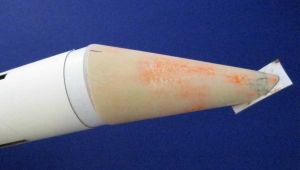 A ram-jet style nose cone was made out off part Q. I cut ½" off the tip with a razor saw
then sanded the cuts flat with a sanding block. More sanding followed until it achieved the right visual balance. This
will be joined to a shortened BT-5 (A) and be glued to the middle of the rudder's butterflied top.
A ram-jet style nose cone was made out off part Q. I cut ½" off the tip with a razor saw
then sanded the cuts flat with a sanding block. More sanding followed until it achieved the right visual balance. This
will be joined to a shortened BT-5 (A) and be glued to the middle of the rudder's butterflied top.
The balsa cone (S) was split down the middle then sanded to the contour of a BT-60. These would be used to make side engine intakes on both sides of the rudder. The BT-20 (C) was split lengthwise down the middle to fit the two sides from the split nose cone.
1-1/4" was cut off the BT-56 (G) to make a coupler. It was split lengthwise and slid it into the BT-55. The overlap was marked then trimmed to fit snugly. It took some "shimming" to make these two (close diameter) tubes fit. The butt-joint was hidden under the rear tubing.
The Red plastic Sanford Pen Casing (KK) was cut into thirds. Two were centered in the front of the wing engine assemblies. The remaining third piece would go out the end of the rudder tube.
The 6-½" long BT-5 tube (A) was cut into equal thirds. I needed two wing "engine tubes" and one rudder ramjet tube.
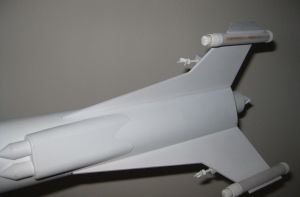 I used the four white plastic engine nacelles on either side of the engine tubes. The front end was cut
down, I didn't want an exhaust nacelle on the front of the engine.
I used the four white plastic engine nacelles on either side of the engine tubes. The front end was cut
down, I didn't want an exhaust nacelle on the front of the engine.
Centering rings were cut out of the shipping box for the stuffer tube inside the rear BT-80 tube. The interior BT-55 tube was offset to the top of the BT-80.
The Stuffer tube was made out of two pieces of BT-55 and 56 (parts F and G) joined by a coupler made from a short piece of the supplied BT-55.
The engine will be a D12 fitting into a BT-50 motor mount tube. (Part E). A 3" piece of BT-50 was cut for an engine mount. The BT-50 was notched for the suppled engine hook (U). The end of the hook extended 1/4" beyond the engine mount tube.
There was plenty of centering rings but no 50/55 rings. From the shipping box, I made a 1" wide centering ring. I kept wrapping the cardboard strip round until it made a slip fit into the BT-55 stuffer tube. I'll lay white glue to plug the open holes in the corrugated cardboard.
There was no Kevlar®, so I made a standard Estes style tri-fold mount.
The engine mount was glued inside the shorter BT-55 tube until the BT-50 engine tube was even with the rear of the 55 tube.
It was obvious to cut the cone (V) down to fit the BT-60 upper tube. I decided to cut it at an angle so the tip would be angled down, much like the old SST Jetliner when it was in flight. However, after trimming it looked too saggy at the front. I trimmed and sanded the tip back at an angle. The hole in the nose cone tip was now an enlarged oval. I cut a piece of scrap BT-55 (H) and CA'd it to the tip. The edges were sanded down to match the new conical shape. The nose cone adapter was easier than I would have thought. I took a piece of BT-60 (I) and split it. It was set into the upper BT-60 and the overhang "tab" was CA'd in place. The adapter was simply glued to the cone edge, centering it all around.
The transition dome (GG) was the hardest to cut out. Even after cutting and making an inside transition angle, the match wasn't close enough for me. I built up the open gaps with strips cut from scrap BT-55. I sanded the fill pieces smooth with sandpaper wrapped around a BT-50 tube scrap.
To form the 55/60 plastic transition (P), the original 3" long BT-60 was cut off the transition piece. I coated the inside with 15 minute epoxy to protect it from the ejection charge.
The upper parachute tubing (J) was a left over tube from a kit, already laser slotted for through the wall fins. I'll have to patch the holes and fill the seams. BT-60 scrap (I) was cut to 1-½" to make an inside tube coupler. This gives an inside wall to glue the patch pieces onto. After the coupler was glued in place, scrap body tube strips were white glued in the slots.
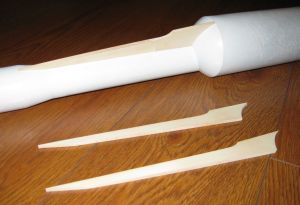 Three transitions vanes were cut from the 1/8" basswood (UU). Two transitions had to be matched, the
curved rear dome (GG) and the upper plastic transition.(P) Also, on the two smaller outside vanes, the dome angle had
to be sanded to an angle to match the curve. This and the dome were the hardest parts of the build.
Three transitions vanes were cut from the 1/8" basswood (UU). Two transitions had to be matched, the
curved rear dome (GG) and the upper plastic transition.(P) Also, on the two smaller outside vanes, the dome angle had
to be sanded to an angle to match the curve. This and the dome were the hardest parts of the build.
Two wings, rudder, and wing tips were cut from the 1/8" basswood. (TT)
The black plastic angles (II) were used for the wing gun housings. I made "plugs" out of laminated scrap 1/8" basswood. The white Star Wars "guns" (00) were shortened and glued into 1/8" holes drilled in the plugs.
The plastic candy package (PP) was sanded to the BT-80 body tube contour. I used only ½" of two ends of the BT–5 pod assemblies(L). They were both sanded to the BT-80 curve and the flat front of the candy package. The assembly was centered to the bottom of the BT-80 then super glued in place.
Finishing:
Finishing the rocket, I did the best I could without too much complex masking. The built rocket was painted gloss
white, the rear engine compartment painted black. The popsicle stick vanes were first painted white, then glued onto
the black engine tube.
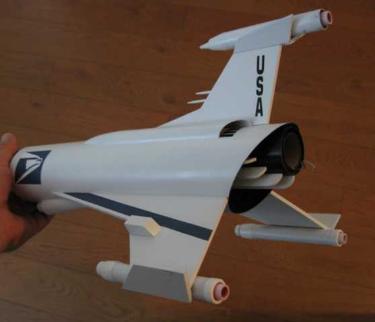 I had plans for using many of the decals that were sent. While there were plenty of decals
included, most all were older and unusable. Some rolled off the paper onto themselves, others cracked. I know there are
decal solvents and repair solutions available, but I didn't have time to order and fly the model by the deadline. I
wanted to use what was supplied. I did the best I could without too much complex masking. I'm not complaining, Mr.
Stewart sent plenty of parts for a fun build.
I had plans for using many of the decals that were sent. While there were plenty of decals
included, most all were older and unusable. Some rolled off the paper onto themselves, others cracked. I know there are
decal solvents and repair solutions available, but I didn't have time to order and fly the model by the deadline. I
wanted to use what was supplied. I did the best I could without too much complex masking. I'm not complaining, Mr.
Stewart sent plenty of parts for a fun build.
The first time, I pieced together some yellow decal stripes on the wings and rudder. Others stayed together enough for the rolled up edges to be tacked into place with white glue. As the decals dried, they pulled up on the edges. I tried re-tacking them down again, but the next day they lifted again. I let things sit for a few days while I tried to think of a solution. I removed most of the lifted decals.
On the USPS Priority Mail Box were names and logos. I lightly scored the eagle logo, names, and navy blue stripes with a razor blade. The thin top layer of paper was peeled off. Using the USPS logos changed the theme and back story of the model.
I lightly wet the peeled paper back with a sponge and carefully scraped off what was left of the brown cardboard layer and glue.
From there is was pretty simple, a thin coat of white glue and placement. I did lay some water on the body tube where the paper art was to go. It helped with the positioning as I could slide the glued paper into position.
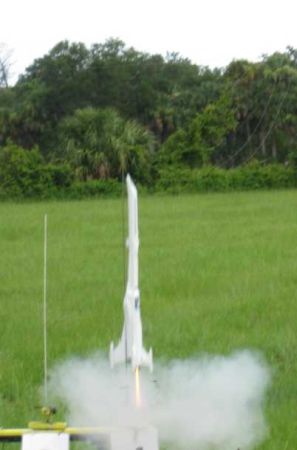
Flight and Recovery:
The first launch was scheduled for June 6, 2009. The weather was clear, but the launch area was waterlogged! Many
days of rain in central Florida had left the launch field too wet and unusable.
I usually don't fly with the "Big Boys" in Bunnell, Florida, but I went to the NEFAR Half-Blast for the first flight on June 13. I flew two small test models before the Postal Express. The loading was typical, a D12-3 and wadding. I was nervous as it was a heavy build with lots of nose weight.
Launch was show and straight maybe to 350 feet. I was concerned the angled nose cone might effect the vertical trajectory, but it didn't seem to affect it at all. It slowed and blew it's chute just prior to apogee. Someone said there was a zipper. There couldn't be a zipper, there wasn't any Kevlar® to cut through the body tube. The shock cord was hanging from about halfway down the body, not from the nose. It was hung up around the toothpicks on the center of the BT-55.
Upon landing, the nose cone broke cleanly away from its adapter. One of the forward fins was gone, broken above the fillet joint. The snap back of the ejection must have hit the forward fin. Both are repairable, and I'll fly it again at the June 27 R.O.C.K. launch.
All repairs were made for the local NAR, ROCK Section of Orlando launch on June 27, 2009. As always, I grabbed a smaller rocket and did a low level test flight to get a feel for the field and conditions. I noticed the plastic dome on the Postal Express transition was loose, and I hit it with a few drops of CA glue. The remembered the earlier flight on a D12-3 thinking ejection was a hair early so I loaded up a D12-5.
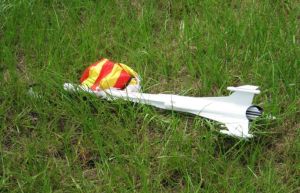 Launch was slow and ejection occurred after apogee, on the way down. The chute ejected but was wrapped
once around the shock cord. It never fully opened but slowed the descent with no damage.
Launch was slow and ejection occurred after apogee, on the way down. The chute ejected but was wrapped
once around the shock cord. It never fully opened but slowed the descent with no damage.
A short rain held up launching for 15 minutes. I loaded up again, this time with a D12-3. This seems to be the best available engine. If someone were to make a D12-4 engine it would be close to perfect. This was the best launch yet. Straight up, full parachute and no damage on landing.
Summary:
PROs: Lots of fun building with supplied parts. Quite a learning experience. When doing an out-of-the-ordinary build,
you change directions many times and pick up a few new techniques along the way.
CONs: Some small parts break off. If I had the resources, it would have flown higher with an E or F engine.
Sponsored Ads
 |
 |




